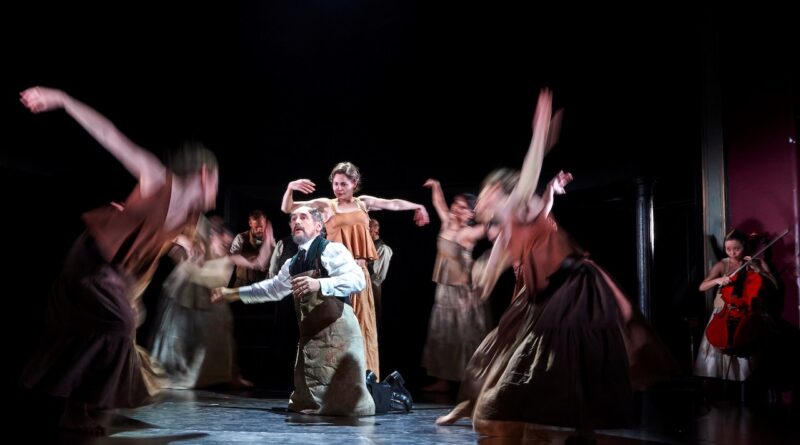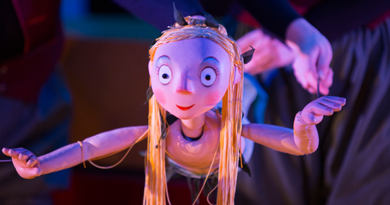Dr Semmelweis at Bristol Old Vic
Our anticipation was high – this is surely the most excited we’ve ever been to sit in theatre seats. Mark Rylance, so well known for his sublime TV portrayal of Thomas Cromwell in Wolf Hall and more recently the disturbing Peter Isherwell in Netflix’s apocalyptic film Don’t Look Up, returns to his theatrical roots in the title role of Dr Semmelweis, a troubled and brilliant outsider, in a play that he co-wrote with Stephen Brown. What’s more, he has teamed up with Bristol Old Vic’s Creative Director, Tom Morris, so we locals get first dibs on a production that must have legs. A World Premiere indeed!
Dr Semmelweis is based on the true story of Ignaz Semmelweis, who fought in vain to be heard among his peers and seniors at Vienna General Hospital during the 19th Century. He noticed that women in childbirth whose babies were delivered by doctors had a much higher rate of mortality than those delivered by midwives. With the help of a cohort of other medical professionals, Semmelweis studied the data and realised that many doctors (particularly student doctors, who tended to treat the less affluent mothers-to-be) also worked and trained in the morgue and frequently moved from that house of death to maternity beds, without changing blood-splattered, disease-ridden aprons or washing their hands and instruments. How to convince the others that hygiene is key in a hospital in an age before the discoveries of Pasteur and Lister? Especially if you are an awkward communicator and, what’s more, your first language is a foreign tongue, Hungarian.
Rylance captures Semmelweis’ frustration brilliantly and we travel with him as he spirals into despair, his mind plagued with mental illness, his confusion laid bare. He is well supported by Sandy Grierson, who gives comedic relief as Jakob Kolletschka in a story that is so serious, so heartbreaking, by Bristol’s own Felix Hayes as a thoughtful and level-headed Ferdinand von Hebra and by the loyal and sensitive Franz Arneth, played by Enyi Okoronkwo. Daniel York-Loh’s Karl von Rokitansy brings theatricality and even a sense of the ridiculous to the hospital, his top hat never leaving his head, even when in unscrubbed scrubs. We’d all like to shake physically the stubborn Alan Williams as Johann Klein, the Medical Director of the Hospital, who has closed ears and a reputation to maintain. It is Jackie Clune as Anna Muller, a nurse who has worked in maternity for more than 20 years, who shines next to Rylance; here is a woman in a man’s world, strong, determined with a playful edge. Our Semmelweis is in trouble and even the love and patience shown by Tahalissa Teixeira’s Maria Semmelweis isn’t enough to pull her husband from his turmoil.
The performance is set in two time periods as, with the help of Franz Arneth, Semmelweis relays the tragic story to his distressed but supportive wife, a story that begins with the scared mother-to-be Lisa Elstein (Clemmie Sveaas), who Semmelweis later realises, knew there was something amiss when, in labour, she begged to be seen by the midwifes, not the doctors. As we flit easily between the two periods, we can’t help think of the parallels to our present day pandemic – listen up everyone (politicians now as the medical profession then), take heed of the data, wash your hands! The cast is bolstered by the patients at the maternity wards, a spectral troupe of dancers, choreographed by Antonia Franceschi, who fill the stage with shifts and shapes; they are the female ghosts of Vienna Hospital, the dead and the yet to be killed by people who refuse to take responsibility for their mistakes or to listen to reason. The Bristol Old Vic stage is as large as it can get and inventive lighting design by Richard Holwell and set design by Ti Green gives it the illusion of being endless, as though we’re looking into the abyss, shadows floating in a liminal space between this world and the next. And there, keeping his eye out, is the skulking Lurch-like figure of Joshua Ben-Tovin’s dual Hospital Porter/Death character, always laying in wait, on hand to whip away the dead mothers with haunting efficiency.
The stage can feel crowded at times (I tried to count how many people but the perpetual movement made such calculations difficult – maybe 20 people at peak?). Music is key to any Bristol Old Vic production and here, adding to the numbers, we are gifted with the Salomé Quartet, who flutter about the stage and auditorium, instruments in hand, translating the music of Adrian Sutton into sorrow, grief, hope. At first, the sheer volume of the cast seems superfluous and I have to remember to peel my eyes away from Rylance and appreciate the whole, to look at the dancers wearing Ti Green’s costumes – mostly muted, of the era, with the occasional burst of colour bringing a sense of other-worldliness. The on-stage near-dizziness is, we discovered, probably very necessary; notwithstanding Brown and Rylance’s word-craft, the subject they are dealing with is dry and life amongst all that death brings fluidity to the piece, a glimmer of hope, the chance to listen and not make the same mistakes again. Perhaps.
Go and see Dr Semmelweis if you can get at ticket. This is Mark Rylance’s first ever performance at Bristol Old Vic and he must leave the stage for no more than two minutes during the whole 2 hours 20 mins of the production! What better reason do you need?
Dr Semmelweis plays at Bristol Old Vic until Saturday 19 Feb




